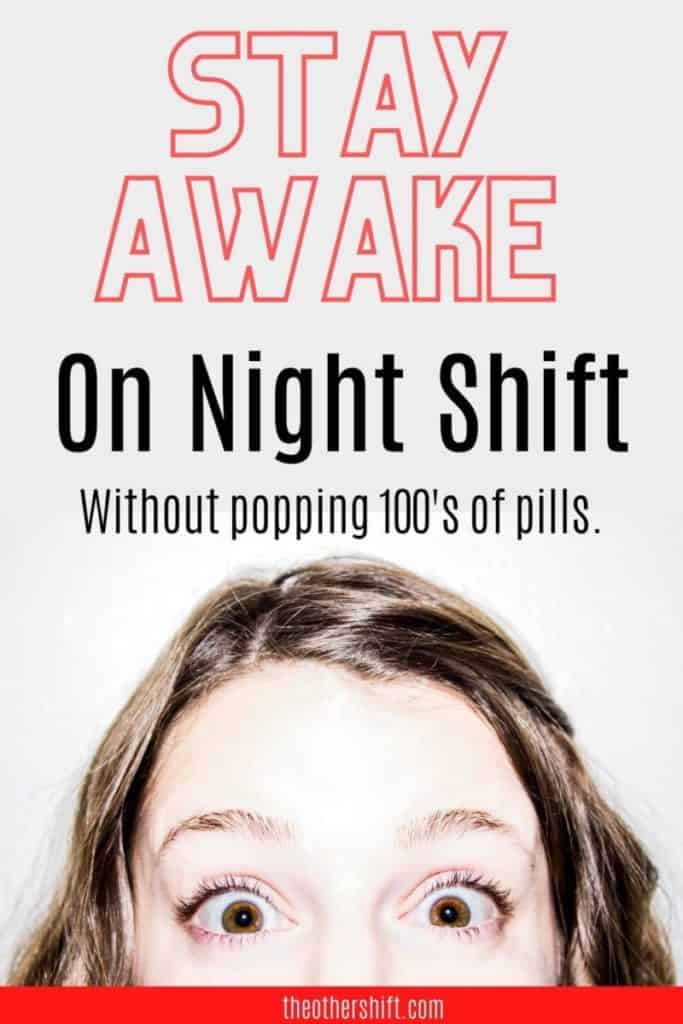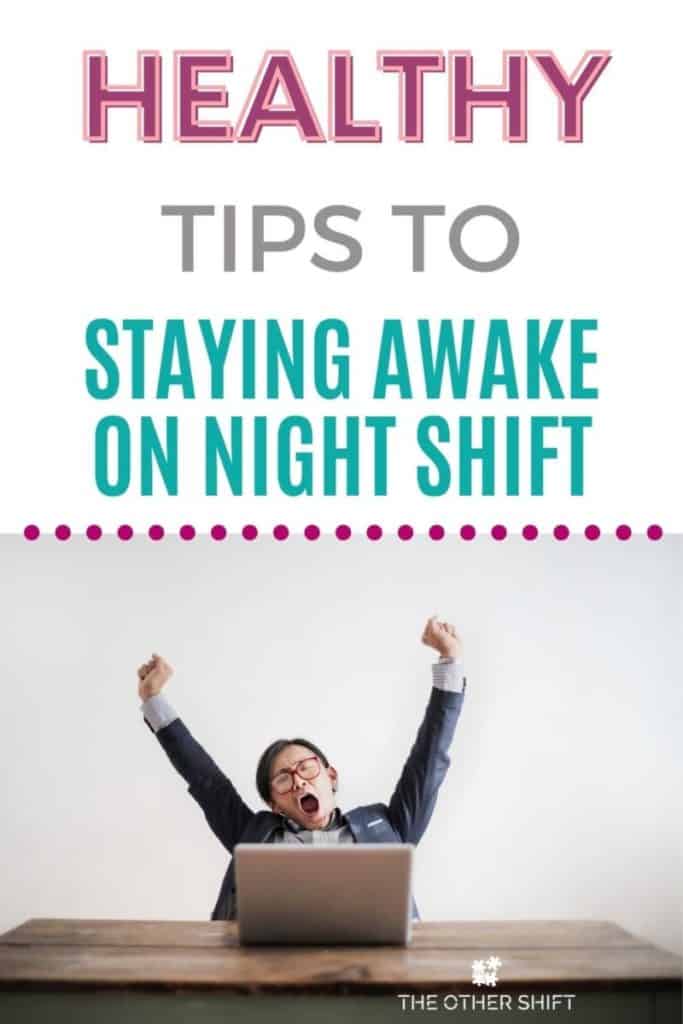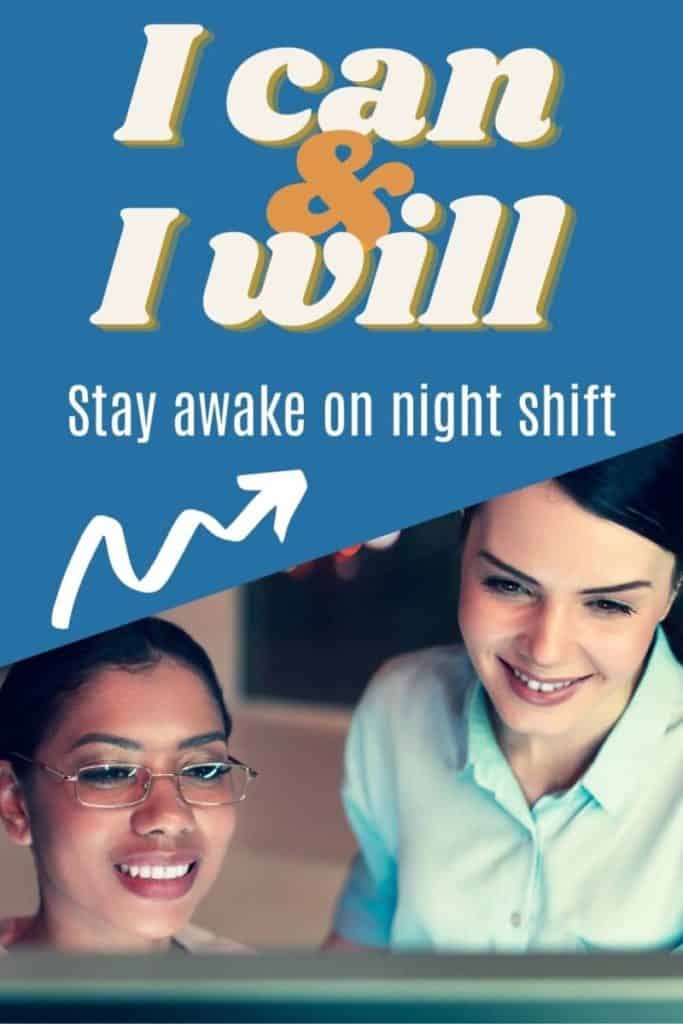Disclosure: This page may contain affiliate links, meaning we receive a commission if you decide to make a purchase through our links, but this is at no additional cost to you. Please read our disclosure and privacy statement for more info.
2am. Cold. Hungry. Minds distracted. Extended blinking with your eyes. Starting to feel cosy. Next minute, you are agitated from your head smacking on the desk after you fell asleep! For most night workers, these actions have occurred at some point in time. But don’t despair; it is possible to stay awake on nights and not become a grump. You just need to know how!
Tips to staying awake on night shift consist of; modifying your sleep environment, your diet, actively exercising, your water intake, energy drink consumption and your background noise level and light volume in your workspace on the job.
There are also energy supplements and prescription medications if things get too bad, but be sure to speak with a medical professional about this before taking anything.
So now into the article, where we’ll explore these areas and more in much greater detail and give you strategies on how to phase the suggestions into your everyday lives.
Changing Your Home Environment
Depending on your living situation, there could be an ample amount of opportunity for you to adjust your living arrangements to help suit your needs. In some cases, only minor modifications might be possible.
Nonetheless, let’s talk about what are some potential options that help with creating a productive home environment so you can get proper rest to assist with fatigue when working nights.
Light
Blacking out all of your windows may not be a feasible option long term, as I’m sure you’d like some sun on those days when you’re not working. So what are the other options?
Along with heavy no-light heavy curtains, like the ones we list in our shift work tools page here, you’ll want to consider getting window tint for your home. Not so much that it blocks out sunlight, but that it dims it and reflects heat and UV rays. We’ll get into later why tinting is essential for people sleeping during the day, but for now, you’ll want to put it a window tint like this from Amazon  on your list with other options that can help control the lighting in your home.
on your list with other options that can help control the lighting in your home.
More and more houses can install adjustable lights, most of which can be controlled with an app on your phone and even set with a timer to use it. These lights can help adjust the intensity of light being shared and having low-intensity light (or limited blue light), is great as you’re trying to prepare to go to sleep after working the night shift.
I found these popular globes on Amazon from a brand called HeoDeng. They are dimmable, compatible with Google Home and Alexia and have a sunrise and sunset timer. They look multicolored but can be placed on a warm white setting. These are the kinds of globes that can simply change the light and atmosphere of any room.
from a brand called HeoDeng. They are dimmable, compatible with Google Home and Alexia and have a sunrise and sunset timer. They look multicolored but can be placed on a warm white setting. These are the kinds of globes that can simply change the light and atmosphere of any room.
[VIDEO] – If you’d prefer to watch the rest of this article rather than read it, the clip below will help you out.
Sound
The best way to combat sound, if it’s nothing else: get earplugs designed for sleeping. Standard earplugs can work, but you want to block enough sound to sleep; it’s not to protect from loud noises. Find comfortable and low-decibel earplugs.
Personally, we love Mack’s Super Soft earplugs from Amzaon which you get check out here, but recently I was asked to try out these reusable silicone earplugs, and they are not half bad either!
and they are not half bad either!
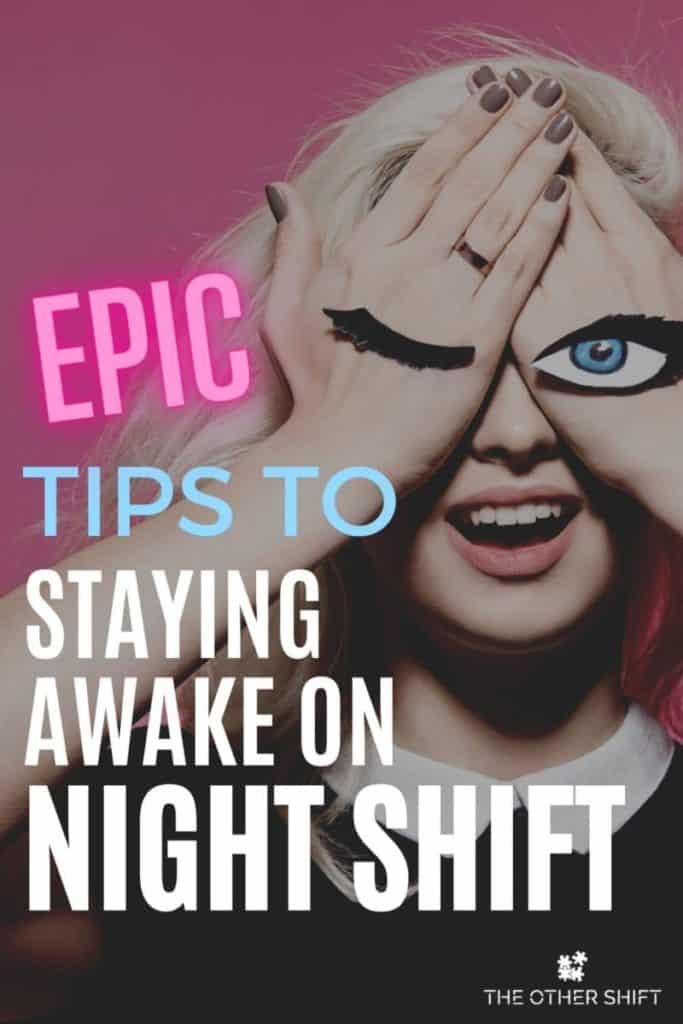
You can also use something to create background noise. A fan is great, but don’t have it aimed directly on you, unless if you need it to help keep cool. Don’t have it oscillate, as this can take away from creating a consistent sleeping environment.
There are devices like white noise machines you can purchase, apps, and even websites with sounds to help you block out other noises and help you relax. Figure out what works best for you, then go from there. The idea is to be comfortable to help get optimal sleep.
you can purchase, apps, and even websites with sounds to help you block out other noises and help you relax. Figure out what works best for you, then go from there. The idea is to be comfortable to help get optimal sleep.

Smells
Yes. We’re going to cover smells. Strong odors can disrupt sleep or make it difficult to sleep. Even a scented candle you enjoy, if it is strong enough, can disrupt your senses and potentially cause you to wake.
Now, this waking up might not be fully awake, you might not even know it, but you might be in a state of consciousness. Frequently waking like this interferes with your body’s sleep cycle. Short term, you won’t notice too much, but long term it can really cause issues.
So regularly clean, have relaxing air fresheners or candles and deodorize messes as much as possible.
Em and I use the diffuser found in our shift work tools page here, with a few drops of essential oils inside to help freshen up our bedroom. It took us a while to settle on a scent we both enjoyed and found relaxing but now we found it we struggle to sleep without it.
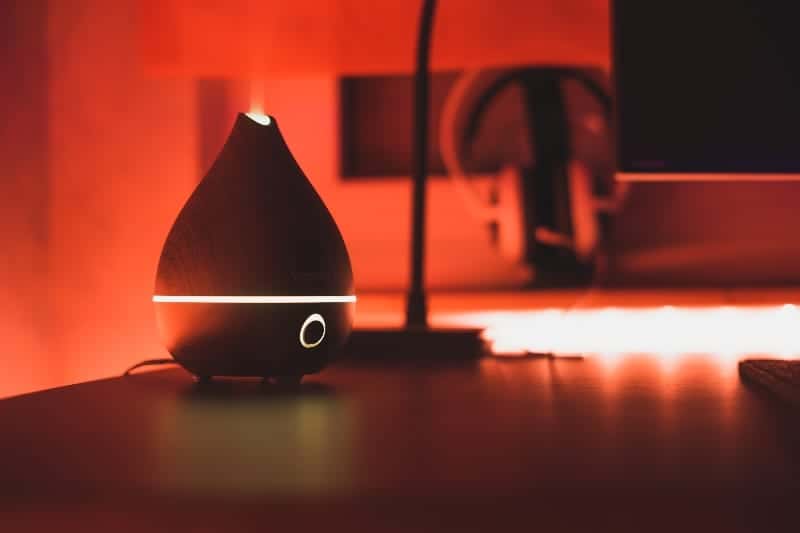
Room Temperature
Lastly, the temperature is crucial to creating a sleep environment that puts you in a state that helps with deep sleep. Most sources recommend an average of around sixty-seven degrees Fahrenheit (or 19 degrees celcius). Obtaining proper rest from creating an ideal room temperature will help you manage your sleep-wake cycles. We’ll discuss later on and in more depth about sleep cycles and why controlling that process with your sleep is so important.
[VIDEO] – Check out my wife Em as she describes why you might be having trouble sleeping after nights and what you can easily do about it.
What We Consume on Night Shift
There is a lot of material available for someone to read through with what foods they should and shouldn’t eat when working night shift. Take advantage of this information and even speak with your doctor about what is right for you. The important part to remember: there are foods both harmful and helpful.
Our Night Shift Diet
Part of what makes people tired after they eat isn’t about the quantity; though that does play a role. It’s that some foods produce chemicals like serotonin. Not directly. Foods with more protein in them, such as chicken, turkey, eggs, beef, nuts, beans, and other foods, contain what is known as tryptophan.
Tryptophan converts into three different chemicals for your body: niacin, melatonin, and serotonin.
Niacin: Your entire body needs this primary chemical to function correctly. It also helps increase energy. However, for the body to do this, it needs proper amounts of vitamin B-6 and B-12, and iron.
Melatonin: Helps regulate your sleep-wake cycle and is mainly produced by the pineal glands. Later on, I’ll discuss in more detail about these glands and your sleep-wake cycle.
Serotonin: This is a complex chemical, and the one mentioned above, which can lead to sleepiness. Serotonin or SSRI is a chemical that regulates mood and can cause a more sedentary type of mood. It also works with helping the pineal glands produce melatonin. Overall: It can make you more sleepy.
Why is it important to understand this? It’s because you want to maintain high levels of energy and not become fatigued. You’ll want to make sure you eat the listed high protein foods in moderation and while also consuming foods that produce vitamin B-6, B-12 and iron to help create more niacin than melatonin and serotonin.
Suggested Foods:
- Oranges
- Apples
- Oatmeal
- Tuna Fish
- Nuts
- Beans
- Avocados
- Potatoes
The above list is only a small sample of the healthy foods suggested out there. Most important is to talk to your doctor about what is best for you. As you may have different health conditions, and adapting sudden dietary changes can cause more damage.
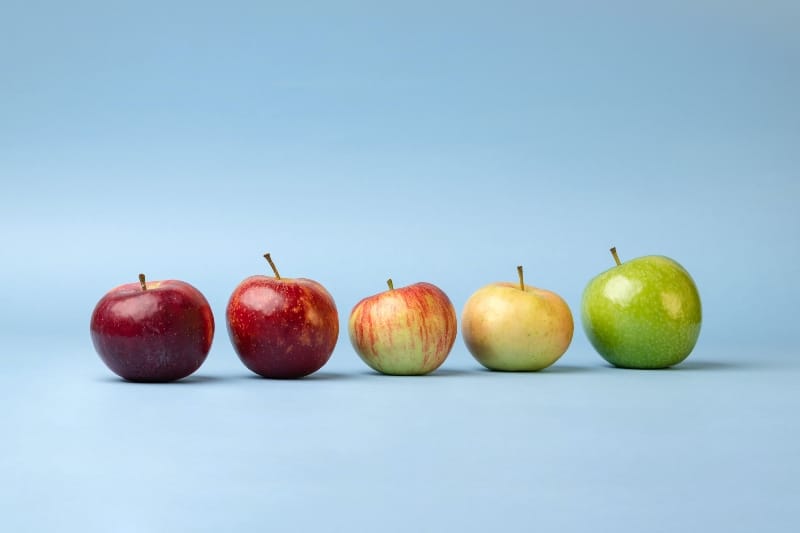
Prescription Medications
There are many prescription medicines a doctor can provide. Speak to them about what is best for you or if it is even needed. One of the many is called Modafinil. It is a highly regulated drug. It helps stimulate your mind and increase energy. It is common for those who work night shifts or suffer from narcolepsy.
You can ask your doctor about this one, or if there are others, they would recommend. However, if you’re managing yourself correctly, there shouldn’t be a need for this. That’s not saying you don’t need this. As some people do require specific medications, it’s important to talk to your doctor about them.
If you’re doing everything you can, but you’re feeling exhausted, there could be something else going on. People have different sleep disorders, such as sleep apnea, and you can follow everything in here, and still fall asleep at work. (Most physicians will likely exhaust several other potential problems first before using medication as a last resort).
Related post: 11 Tips For Night Shift Workers Considering Melatonin
Water
The suggested intake is your body weight in half, which equates to how many ounces you should drink per day. If you weigh 200 pounds, you should be drinking 100 ounces of water per day. This is, of course, if you are mostly inactive.
Low water intake can cause your body overall to have to work harder than usual; this increased effort can cause fatigue. It can also reduce how well the body regulates its temperature, leading to being overly warm or cold. It can also reduce cognitive processing.
The above formula is the minimum amount of water. If you’re finding yourself tired, having headaches, and unable to think clearly, it could be because you are dehydrated.
Never pass up an opportunity to get a drink of water. Consume water with your meals. If you are more active at work, then you’ll want to increase your water intake.

 to keep our water cold and coffee hot. Get yourself on here.
to keep our water cold and coffee hot. Get yourself on here.
Food Quantity
We’ve discussed types of food to consume, but what about quantity? Yes, the amount of food you eat plays a significant role in being tired. The more you consume, the more work your digestive system has to put in. More energy is pulled from elsewhere to help process everything—reduced oxygen to the brain, slower heart rate, and more.
You do need to eat. Your body needs fuel to burn to provide you with the energy you need to function. Eat smaller and more frequent meals. This will reduce the strain on your digestive system and allow you to maintain higher levels of energy during the night.
Potential Food Items To Avoid
As many things go, there is a time and place for certain activities. The same goes for what we eat and drink on night shift. Regular consumption of alcohol can cause a variety of issues. It can slow your metabolism, taking longer and more effort to process foods. It reduces the ability to absorb much-needed nutrients from the foods we eat. Alcohol even reduces the very compound that creates energy.
Adenosine triphosphate is a compound that is the primary source of energy for just about everything. Alcohol can cause an imbalance of water within your body, reducing the ability to create adenosine triphosphate. This reduction means a lot less energy for you.
Avoid overly greasy, processed foods. As there is little in the way of nutrients, they’re high in calories and causes your digestive system to work more to process it; and it’s unlikely that most of those calories will also be used. Fats from processed food tend to be stored and eventually lead to obesity, making the body work more and reducing energy.
Avoid caffeinated drinks, coffee, energy drinks, or other related stimulants several hours before sleep. While you’re sleeping, it might not seem like it, but these stimulants are still working and preventing you from going through a proper and full sleep cycle. Once or twice and you might not feel it, but ongoing and you’ll start to develop other issues from poor sleep quality.
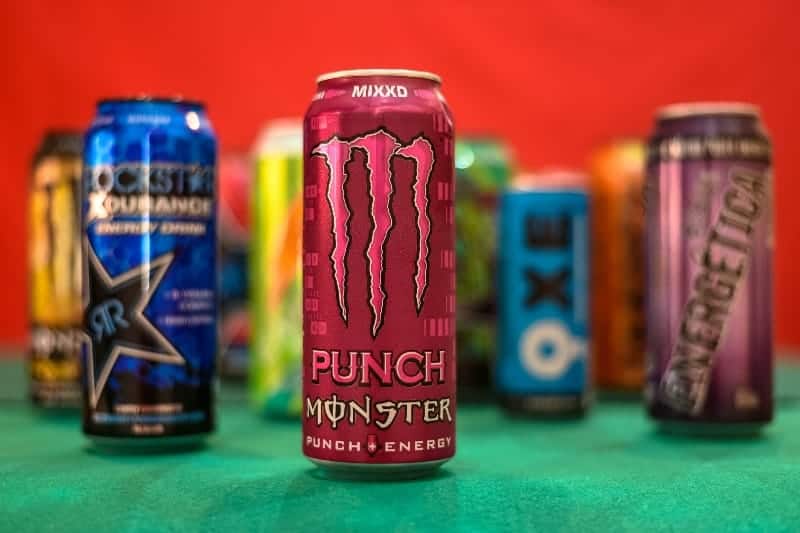
On The Night Shift Job
You’ve gone through and made improvements to your environment, you’re on a healthy diet and even spoken to your doctor about different medicines. What’s next? More specifically, what can you do on the job?
Exercise:
Exercising might sound counter-intuitive, but it helps to stimulate the body, increase blood flow, and helps burn foods you’ve consumed. Now, exercising might not be an option for you, but maybe there are movements you can do that would allow you to get the blood pumping!
The goal is to move outside the regular movements of what you typically do at work and to try and elevate your heart rate.
Related post: What’s the Best Exercise Workout Routine for Shift Workers?
Stepping Outside:
It might not seem like it, but stepping outside for a breath of fresh air can improve energy and overall health. As indoor air is typically closed in and is continually circulated within, the pollutant levels increase.
Low air quality can cause several issues, including reducing the amount of proper oxygen to your brain, leading to dizziness, headaches and slower response. It also slows your metabolism, making the body work more to process what you’ve eaten. You can be left feeling fatigued and dizzy.
Stepping outside for a little bit to breathe in the fresh air will give a sudden boost of oxygen to your lungs. It will help immediately clean out the pollutants you’ve been breathing from the closed-in space. It will send higher-levels of oxygen to your brain, making you more alert.
The increased oxygen in your blood will help other areas of your body, including your digestive system and extracting those nutrients that help provide you with energy.
Improved Work Space:
Improvement in your workspace can help with working the night shift. It could be something as simple as a sit-stand desk if you have a more sedentary job. Many people have a sit-stand desk for a variety of reasons, but it also can help with improving blood flow, which will increase energy.
Making sure your area is also properly ergonomic – designed to make you productive and enhance your capabilites. Not only is proper ergonomics a safety concern, but it allows the body to function without increased effort.
Depending on your work, you might be able to have a window or two open that you wouldn’t be able to during the day shift. This can lead to a more constant flow of air, which goes back to the benefits of fresh air.
With a variety of work situations, there can be many different methods of improving your workspace. Think about how you can have increased mobility as you work, fresh air, proper ergonomics, or anything else that you can do to maximize your area to help stay alert and focused.
Night Shift Coworkers:
Yes. The night shift might have fewer people working, but it doesn’t mean you can’t have quality engagement. Understandably, there are some jobs that it’s not feasible to engage with coworkers continually. However, if you’re able to do so periodically, then this can help keep you stimulated and alert.
You can also find a way to compete or engage in some activity with coworkers. This can take away the monotony of the job. Whereas your day-shift counterparts are monitored more closely, you don’t have to worry about the same level of scrutiny, allowing you to have more interaction with your coworkers.
You can also talk to your coworkers about both of you helping each other stay awake. There might be times where you are struggling, and then there are times they are struggling. Even with all of the suggestions, as mentioned earlier, it can be challenging. Working the night shift goes against how we naturally function remember.
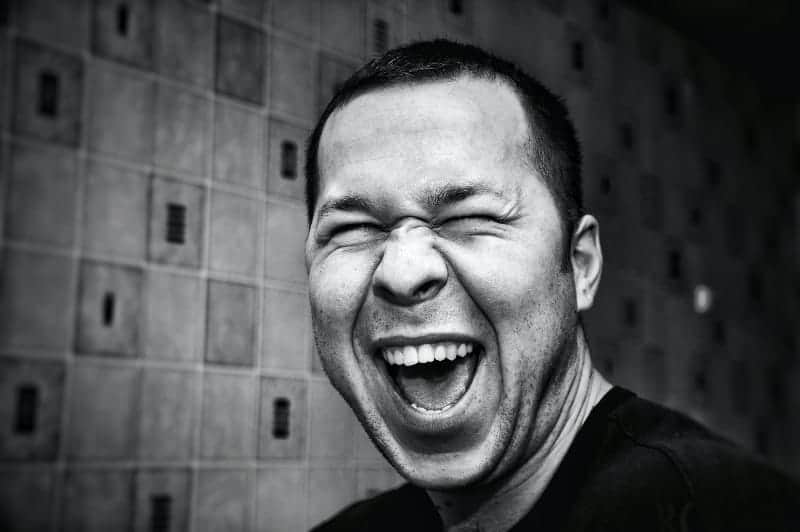
Energy Drinks:
There are many drinks out there with “energy” listed in the title. Which, for the most part, does provide a sudden oomph.
Most will give you a dramatic increase of caffeine, which works to block the chemical adenosine in our brain involved with sleep. Blocking these chemicals subsequently triggers a fight or flight response with a dramatic increase of adrenaline. It’s more anxiety-inducing than energy, but it will create the desired effect.
Energy drinks are made with a variety of chemicals that stimulate the body in different ways. Overall, they can create an abnormal increase in your heart rate. In moderation: Energy drinks are relatively harmless; however, prolonged use and in large amounts can impact your ability to get proper sleep, can cause ongoing anxiety, reduced ability to think clearly, and can cause dehydration at a quicker rate, and other issues.
Use this sparingly. The body can also adapt, and it will require more to obtain the desired effect. While needing more, it will continue to cause harm and even lead to significant disruption with your ability to get proper sleep.
If you’re stuck on what to drink on night shift for energy, take a look at this post for some inspiration.
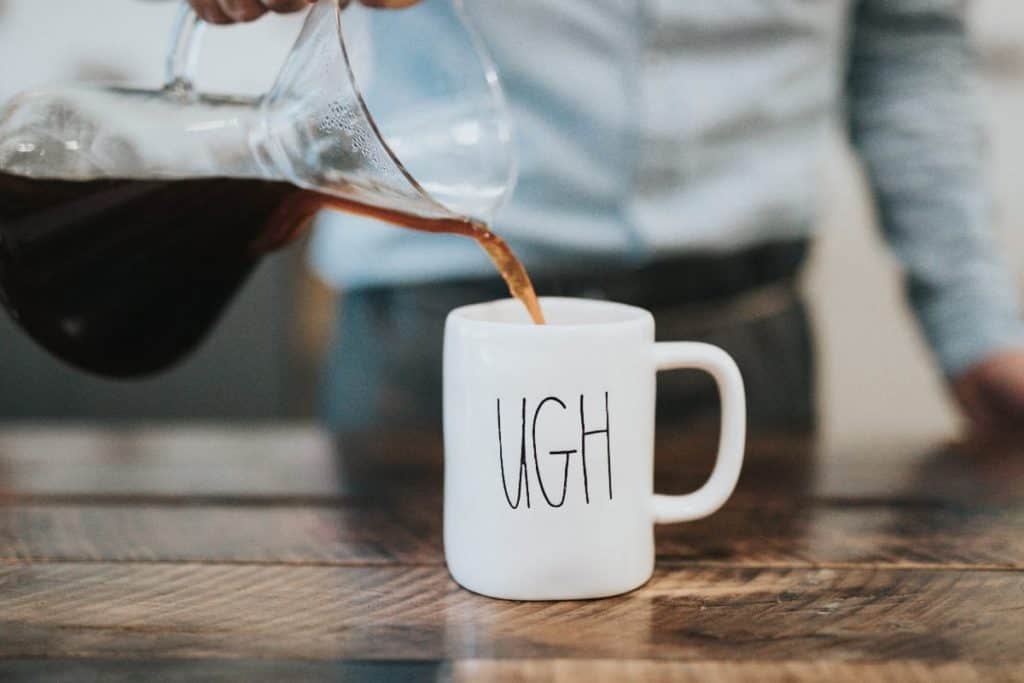
Alternative Background Noise:
Not all positions will allow music, TV, or something else, but if your job does allow some degree of this kind of media, then take advantage. As stated earlier, where music or specific sounds can help you go to sleep, they can also help keep you awake.
Since you want to stay awake, aim for something around 120 to 140 beats per minute. Such as Bad Romance by Lady Gaga for example. A lot of music falls into this category. It’s an ideal rhythm for running. This pace can help put your mind into a mode more akin to engaging in cardio exercise, which also increases your heart rate.
Conversely, if you’re looking to reduce your heart rate, then something with low beats per minute, such as Marconi Union’s Weightless . It has around 60 beats per minute, then slows to 50. Your brain responds to these rhythms and signals for the body to move faster or move slower.
. It has around 60 beats per minute, then slows to 50. Your brain responds to these rhythms and signals for the body to move faster or move slower.
Avoid music or other programs you are familiar with or those which can cause a distraction. While it might be enjoyable, it can take away the focus of your work, or the familiarity can produce a more calming effect.
Next:
Summary: Tips To Staying Awake On Night Shift
What was mentioned here is only a small part of what you can do to combat fatigue from working the night shift.
The focus is on managing yourself and the environment around you to facilitate as much as possible a healthy adaptation to working the night shift. You want your body to work with you, not to fight you. Making those changes that can help produce a healthy lifestyle to the night shift will reduce the need for alternative methods such as taking Modafinil or drinking large quantities of energy drinks.
Over time, you’ll naturally adjust to working the night shift, and staying awake and focused will be easier. Make sure you consult your doctor before making any significant changes or adding supplements. What works for someone else may not be what you specifically need, more so it can be harmful.
The ultimate tip, trick, or hack in surviving the night shift and staying awake is creating a healthy lifestyle. Eventually, the short-term tricks will catch up and can lead to other serious health issues besides fatigue while working. Do it right, do it smart, and be healthy. You’ll be able to sustain a long career working the night shift, and taking advantage of the many benefits working the night shift can provide you.
Next up, 8 Useful Hacks for Surviving Night Shift With No Sleep.
Cheers,

Disclosure: This page may contain affiliate links, meaning we receive a commission if you decide to make a purchase through our links, but this is at no additional cost to you. Please read our disclosure and privacy statement for more info.

